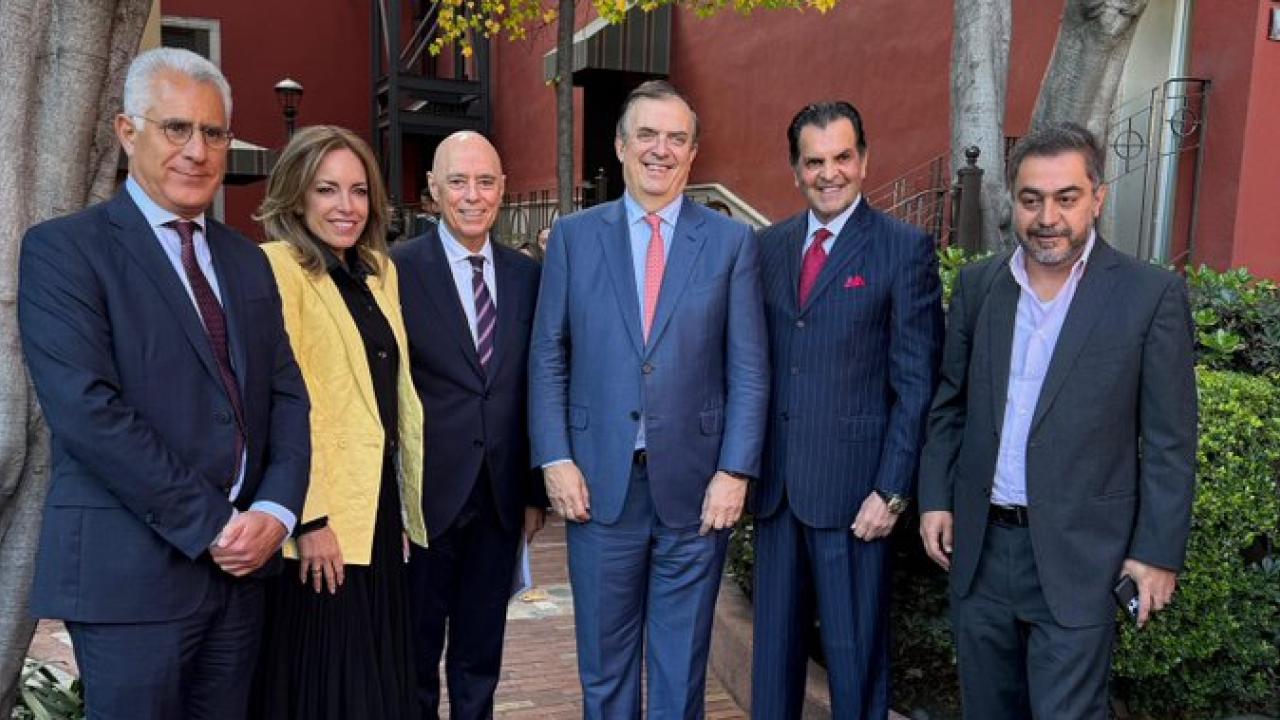
Economy Secretary Marcelo Ebrard said that the country has the success of the T-MEC, its economic strength and recently improved security and migration figures in its favor.
In the face of Donald Trump's tariff threats once he takes office as president of the United States on January 20, Mexico has structural advantages to negotiate the non-imposition of tariffs, said Marcelo Ebrard, Secretary of Economy, this morning.
Among them, he said, are the benefits that the United States-Mexico-Canada Agreement (USMCA) has brought to the United States, the strength of the Mexican economy and the fact that the security and migration situation has improved in recent months.
“Our number one starting point is that the treaty we signed with President Trump has been a great deal,” he said during his participation in the 2025 Economic Outlook Seminar organized this morning by the Autonomous Technological Institute of Mexico (ITAM).
He said that one example of this is how the USMCA improved the competitiveness of American automotive companies, General Motors, Ford and Stellantis, whose survival is at stake, he said, with the continuity of the agreement, since today they are facing greater cost pressures in the face of competition from Chinese brands on the road to electromobility.
“The main automotive exporters from Mexico to the United States are those with the greatest relative weight for exports in Mexico and those that are subject to the greatest competition in the world. The USMCA has been a great business, which explains why these companies have been able to survive,” he said.
He also explained that the Mexican economy is now solid, with unemployment lower than that of the United States, record levels of Foreign Direct Investment and fixed investment levels of almost 25% of GDP.
"You are not arriving in a situation of economic weakness that could put you in a fragile position for negotiation," he said.
Extra-economic factors
He acknowledged that non-economic factors related to security and migration will also be on the negotiating table, but he explained that, in both cases, the figures are also favorable for Mexico, since improvements are observed.
In the first case, he cited that fentanyl deaths in the United States are declining, according to statistics from the National Center for Health in that country.
“There is a lot of discussion about why, but the trend is favorable for Mexico in that sense. We are more or less 20% below the 23%. If this is maintained in the conversations, you are on a favorable trend for your interlocutor,” he argued.
Regarding migration, he said that the flows to the United States have also decreased due to measures such as the new CBP One mechanism, which allows migrants to schedule appointments online for asylum applications, which reduces the number of migrant journeys to the border.
“Outside of the economic elements, migration and security, you have to say in terms of their indicators (from the United States government) we are doing well.”
New protectionism
Marcelo Ebrard also acknowledged that protectionism, which Donald Trump had already advocated during his first term, has now become a political consensus in the United States, but he said he was confident that politicians in that country would concede that widespread protectionism was not rational.
“In this new era of protectionism, it is compatible to have a very aggressive strategy with Mexico and China at the same time. In our opinion, the calculation is that it is not possible. You cannot have low inflation and sustainable growth in the United States if you are applying very strong protectionism in Mexico with respect to China,” said the head of the Economy.
In late November, Donald Trump threatened to impose widespread tariffs of up to 25% against Mexico, China and Canada until drugs and migrants stopped entering the United States across the border.
But Ebrard was confident that the tariffs would be considered unfeasible. “You cannot simultaneously take measures to decouple from China and be protectionist with Mexico. Structurally, it is not possible. We have discussed it with many of those who argue that it is possible and they end up conceding that it is not possible. That will be Mexico’s strategic advantage,” he reiterated.
Symmetry in measures against China
The Minister of Economy also explained that Mexico will not accept pressure from the United States to block Chinese investment. Instead, it will seek symmetrical measures on both sides of the border against such investment flows.
"The United States is home to the largest Chinese investment in North America. More than 85% of the recorded investment. According to known or accepted figures," he said.
He also noted that the only Chinese BYD plant in the region is in Pasadena, California, where transport vehicles are manufactured.
“Chinese investments are allowed in many sectors. Where I see that there are clear restrictions or restrictions linked to what concept: security. And vehicles have already become a security issue. (But) one of the issues to be addressed is that we have to follow the same policy, because there is no way that there can be no investment here and there can be there,” he concluded.









